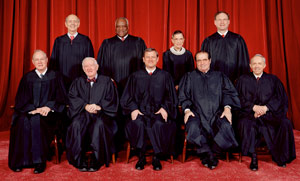The Confrontation Clause And Evidence-Based Prosecutions
Even when a victim herself refuses to testify in court against an abuser, there may be other sources of evidence originating with the victim that might support a criminal conviction, such as a call to 911 for assistance or statements to a health care professional who treated the victim following an assault. The effort to move forward with a criminal domestic violence proceeding in the absence of the victim's testimony is known as “evidence-based prosecution.” Two recent Supreme Court decisions addressed the impact such prosecutions may have on a defendant's right to confront and cross-examine the witnesses against him.
 In Crawford v. Washington, 541 U.S. 36 (2004), the Court held that admissibility of a non-testifying victim's out-of-court statement turns on whether the statement is “testimonial” or “non-testimonial” in nature. A testimonial statement is one made "under circumstances which would lead an objective witness reasonably to believe that the statement would be available for use at a later trial." Id. at 51-52. Where testimonial evidence is at issue, the Sixth Amendment requires availability and a prior opportunity to cross-examine the witness. In Crawford, therefore, the Confrontation Clause precluded introduction of the non-testifying wife's recorded statement given to police in anticipation of prosecution, where the defendant had not had an opportunity to cross-examine the declarant.
In Crawford v. Washington, 541 U.S. 36 (2004), the Court held that admissibility of a non-testifying victim's out-of-court statement turns on whether the statement is “testimonial” or “non-testimonial” in nature. A testimonial statement is one made "under circumstances which would lead an objective witness reasonably to believe that the statement would be available for use at a later trial." Id. at 51-52. Where testimonial evidence is at issue, the Sixth Amendment requires availability and a prior opportunity to cross-examine the witness. In Crawford, therefore, the Confrontation Clause precluded introduction of the non-testifying wife's recorded statement given to police in anticipation of prosecution, where the defendant had not had an opportunity to cross-examine the declarant.
Subsequently, in the consolidated cases of Davis v. Washington and Hammon v. Indiana, 546 U.S. 1213, 126 S. Ct. 2266 (2006), 2006 U.S. LEXIS 1835, the Court considered further the scope of "testimonial" statements in two cases arising from domestic violence prosecutions. The Court held that a statement is "non-testimonial" when made under circumstances objectively indicating that the primary purpose of the statement was to secure police assistance to meet an ongoing emergency. Statements are “testimonial” when the circumstances objectively indicate that there was no such ongoing emergency, and that the primary purpose of the statement was to establish or prove past events potentially relevant to later criminal prosecution. This type of statement is made during "interrogations solely directed at establishing the facts of a past crime, in order to identify (or provide evidence to convict) the perpetrator." Davis, 126 S. Ct. at 2276 (citing Crawford, 541 U.S. at 53). Whether a statement is testimonial is an objective question, not subjective.
